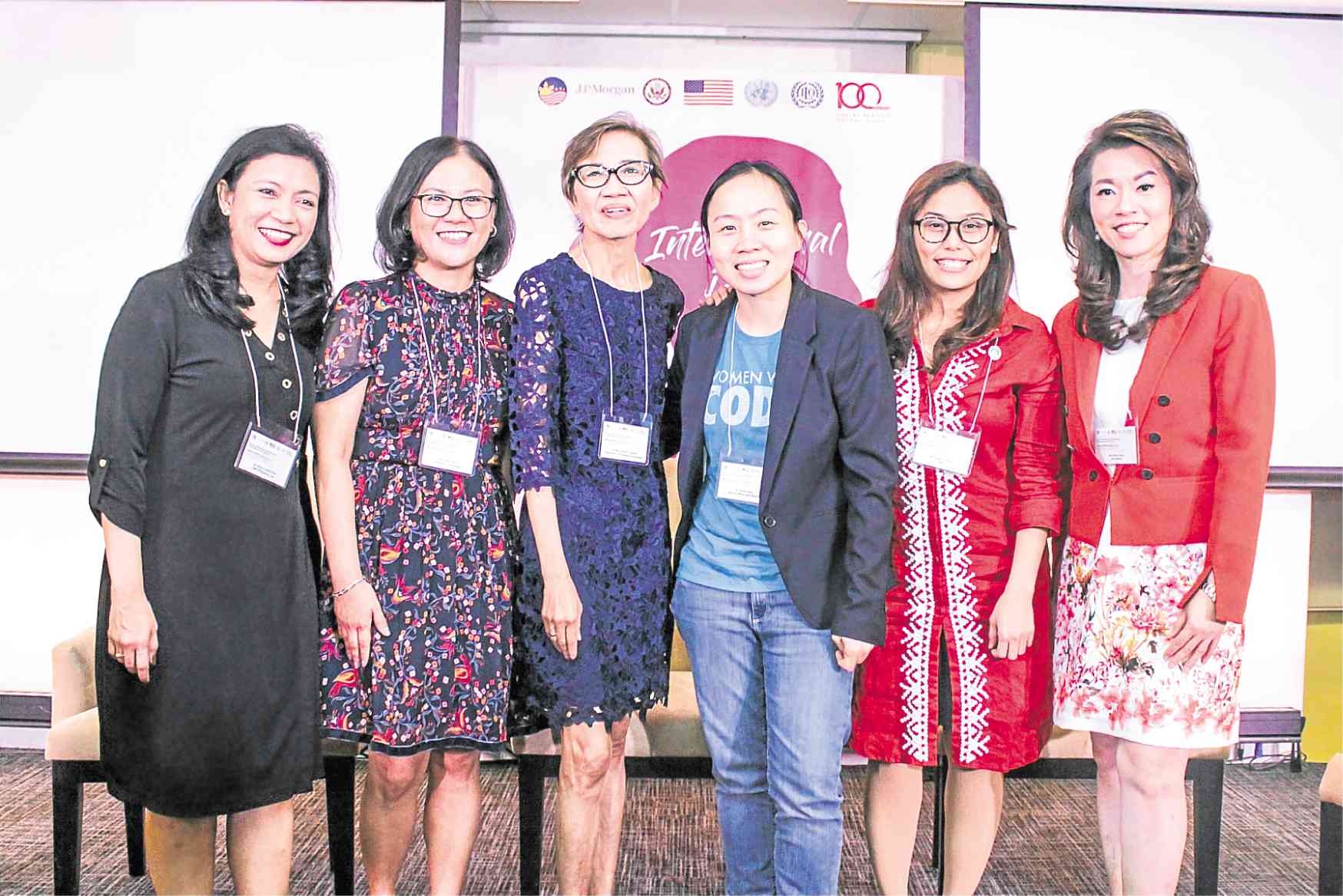Blurring gender lines with science, technology

WOMEN LEADERS IN STEM (From left) Aileen Judan-Jiao, IBM; Ambe Tierro, Accenture Technologies; Ma. Cristina Coronel, Pointwest Technologies Corp.; Michie Ang, Women Who Code Manila; Linartes Viloria, International Labour Organization; and Ca thy Yang, news anchor
Women who want to excel in the workplace have no choice but to change and upscale their skills, “as today’s skills will not match tomorrow’s needs.”
Thus said Linartes Viloria, national project coordinator of the International Labour Organization’s (ILO) Women in STEM Workforce Readiness and Development Program.
Gender inequality could even worsen because of technological advances. Training and/or retraining of women is therefore needed to level the playing field in the workplace.
In the recent Filipina STEM Leaders Forum to mark the UN International Day of Women and Girls in Science, speakers encouraged women to consider STEM skills and training to increase their chances of employment.
STEM stands for Science, Technology, Engineering and Mathematics—fields of studies that are traditionally men’s domains and where women generally do not, or are not encouraged to, venture into.
Speakers stressed “women can do what men can do” and aptitude and capability had nothing to do with gender.
One obstacle that has to be overcome—and a major reason why women still avoid STEM—is “the lack of role models,” Viloria said.
With the skills shift in the Association of Southeast Asian Nations region because of new technology, Viloria said there was a need to eliminate gender bias and the stereotyping of jobs as for men or women only.
Viloria suggested partnerships with corporations and the adoption of work-based training programs to provide women the skills they needed to fit in the changing workplace and bridge the gender gap.
Echoing Viloria’s observation about having few women role models in STEM, forum panelist Ambe Tierro, senior managing director for global artificial intelligence of Accenture Technologies, said women bosses were very few, particularly in STEM.
Panelist Aileen Judan-Jiao, IBM president and country manager, said while many girls showed an interest in STEM, “the problem is how to sustain that interest.”
Another panelist, Michie Ang, founding director of Women Who Code, said “having role models is important [because it lets women] know it (going into STEM) can be done.”
She said there was a need to create awareness that women could go into STEM.
But the forum also recognized the difficulty women faced, being active in the workforce and performing their responsibilities as housewives and mothers.
Judan-Jiao said women had to integrate work and their family lives. Tierro said women had to make important decisions, like choosing the right, supportive partner and when to have children to succeed in the workplace.
“There is a need to reassure women that they can both be mother and worker,” said Ma. Cristina Coronel, president and chief executive officer of Pointwest Technologies Corp.
Reactor Antonio Asper, vice president of the Federation of Free Workers, said men had to share in the domestic duties.
He noted that, while trade unions were still predominantly male, one of five of his organization’s affiliates now was a women’s group.
Women, he said, should organize and learn to negotiate. They could assume the leadership in the fight against discriminatory practices and promote and protect the rights of women in their places of employment.
Roland Moya, director general of the Employers Confederation of the Philippines, said opportunities should be provided for women in the workplace.
He added that women and men have different requirements and they should all be addressed for gender equality.
Clara Ignacio, chief of the women’s center of the Technical Education and Skills Development Authority, said her office was promoting the increased participation of women in STEM and other other jobs not traditionally for women.
However, she said enrollment in the training programs was very low. They also needed women trainers.
Judan-Jiao said they were trying to work with educational institutions to change the mind-set of girls about STEM courses. Tierro said Accenture, for its part, was conducting online training programs so even those outside Metro Manila could participate.
In his closing remarks, Jordi Prat Tuca, regional coordinator of ILO’s Women in Stem Workforce Readiness and Development Program, said “technology was changing jobs and many low-level jobs would disappear due to automation so there is a need to shift occupational structures.” —CONTRIBUTED
